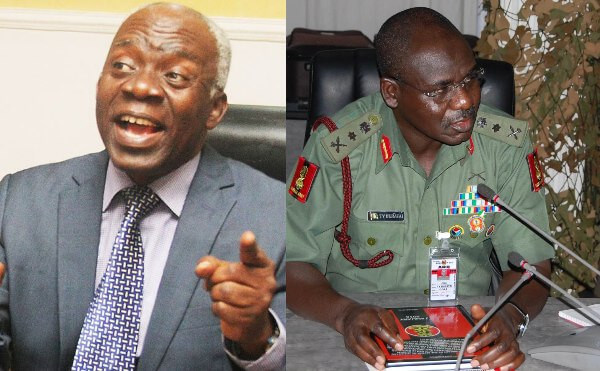The Federal High Court in Lagos says the federal government has no power to go ahead with the “Operation Positive Identification” as it would breach the citizens’ fundamental Human Rights.

Justice Rilwan Aikawa upheld the Fundamental Rights Enforcement Suit instituted by human rights lawyer, Femi Falana (SAN)over the planned implementation of the “Operation Positive Identification’.
While dismissing the objections of the Attorney General of the Federation and the Nigerian Army, the judge held that the applicant, Femi Falana SAN has the locus standi to have instituted the suit.
The judge also ruled that the fundamental rights of the Nigerian people to liberty and freedom of movement would be breached by the planned positive identification.
had filed the Fundamental Rights Enforcement suit on the 25th of October against the planned exercise by the army scheduled to hold from 1 November to 23 December 2019.
He listed the Nigerian Army, the Chief of Army Staff, Lieutenant General Tukur Buratai, and the Attorney General of the Federation, Abubakar Malami, as the respondents to the suit.
The senior lawyer in his suit asked the court to halt the implementation of the exercise, arguing that the operation – which would entail Nigerians to move around with a valid means of identification such as the National Identification Card, Voters Registration Card, Drivers’ Licence and passports or other valid official identification – is unconstitutional, illegal, null and void.
Citing several authorities, Mr Falana submitted that armed troops are not allowed by law to mount checkpoints on highways in the country. He says this is a job for the police and the respondents have not shown why the soldiers must take over the duties of the police. He also submitted that the appellate courts have ruled severally that the army has no business in civil actions neither are they allowed to get involved in elections.
He argued that the relief sought pertains to his right to life, liberty, and freedom of movement as there was a likelihood that the soldiers could shoot to death any individual who failed to produce any means of identification on demand.
He urged the court to grant his fundamental rights application which he insists are completely anchored on Chapter 4 of the Constitution.
But the three respondents to the suit filed a preliminary objection challenging the suit.
In his ruling on the issue, Justice Aikawa dismissed the objections of the Attorney General of the Federation and the Nigerian Army and held that the applicant has the locus standi to have instituted case.

